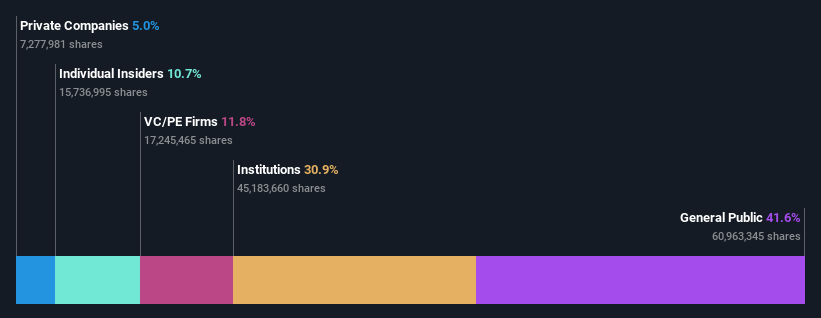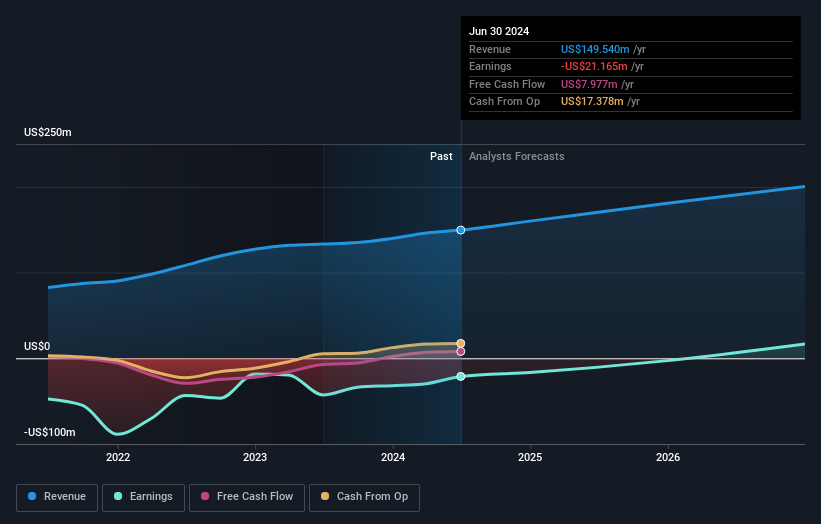- United States
- /
- Media
- /
- NYSE:CTV
While institutions invested in Innovid Corp. (NYSE:CTV) benefited from last week's 15% gain, individual investors stood to gain the most

Key Insights
- Innovid's significant individual investors ownership suggests that the key decisions are influenced by shareholders from the larger public
- 50% of the business is held by the top 16 shareholders
- 11% of Innovid is held by insiders
If you want to know who really controls Innovid Corp. (NYSE:CTV), then you'll have to look at the makeup of its share registry. We can see that individual investors own the lion's share in the company with 42% ownership. That is, the group stands to benefit the most if the stock rises (or lose the most if there is a downturn).
While individual investors were the group that reaped the most benefits after last week’s 15% price gain, institutions also received a 31% cut.
Let's take a closer look to see what the different types of shareholders can tell us about Innovid.
See our latest analysis for Innovid

What Does The Institutional Ownership Tell Us About Innovid?
Many institutions measure their performance against an index that approximates the local market. So they usually pay more attention to companies that are included in major indices.
We can see that Innovid does have institutional investors; and they hold a good portion of the company's stock. This implies the analysts working for those institutions have looked at the stock and they like it. But just like anyone else, they could be wrong. It is not uncommon to see a big share price drop if two large institutional investors try to sell out of a stock at the same time. So it is worth checking the past earnings trajectory of Innovid, (below). Of course, keep in mind that there are other factors to consider, too.

Innovid is not owned by hedge funds. Our data shows that Sequoia Capital Operations LLC is the largest shareholder with 6.6% of shares outstanding. Vintage Ventures Advisors Ltd. is the second largest shareholder owning 5.2% of common stock, and Phoenix Investments & Finances Ltd holds about 5.1% of the company stock. In addition, we found that Zvika Netter, the CEO has 4.2% of the shares allocated to their name.
After doing some more digging, we found that the top 16 have the combined ownership of 50% in the company, suggesting that no single shareholder has significant control over the company.
While studying institutional ownership for a company can add value to your research, it is also a good practice to research analyst recommendations to get a deeper understand of a stock's expected performance. There are a reasonable number of analysts covering the stock, so it might be useful to find out their aggregate view on the future.
Insider Ownership Of Innovid
The definition of an insider can differ slightly between different countries, but members of the board of directors always count. Management ultimately answers to the board. However, it is not uncommon for managers to be executive board members, especially if they are a founder or the CEO.
Most consider insider ownership a positive because it can indicate the board is well aligned with other shareholders. However, on some occasions too much power is concentrated within this group.
It seems insiders own a significant proportion of Innovid Corp.. Insiders own US$29m worth of shares in the US$266m company. It is great to see insiders so invested in the business. It might be worth checking if those insiders have been buying recently.
General Public Ownership
With a 42% ownership, the general public, mostly comprising of individual investors, have some degree of sway over Innovid. While this group can't necessarily call the shots, it can certainly have a real influence on how the company is run.
Private Equity Ownership
Private equity firms hold a 12% stake in Innovid. This suggests they can be influential in key policy decisions. Some might like this, because private equity are sometimes activists who hold management accountable. But other times, private equity is selling out, having taking the company public.
Private Company Ownership
It seems that Private Companies own 5.0%, of the Innovid stock. It's hard to draw any conclusions from this fact alone, so its worth looking into who owns those private companies. Sometimes insiders or other related parties have an interest in shares in a public company through a separate private company.
Next Steps:
I find it very interesting to look at who exactly owns a company. But to truly gain insight, we need to consider other information, too. To that end, you should be aware of the 1 warning sign we've spotted with Innovid .
If you would prefer discover what analysts are predicting in terms of future growth, do not miss this free report on analyst forecasts.
NB: Figures in this article are calculated using data from the last twelve months, which refer to the 12-month period ending on the last date of the month the financial statement is dated. This may not be consistent with full year annual report figures.
New: AI Stock Screener & Alerts
Our new AI Stock Screener scans the market every day to uncover opportunities.
• Dividend Powerhouses (3%+ Yield)
• Undervalued Small Caps with Insider Buying
• High growth Tech and AI Companies
Or build your own from over 50 metrics.
Have feedback on this article? Concerned about the content? Get in touch with us directly. Alternatively, email editorial-team (at) simplywallst.com.
This article by Simply Wall St is general in nature. We provide commentary based on historical data and analyst forecasts only using an unbiased methodology and our articles are not intended to be financial advice. It does not constitute a recommendation to buy or sell any stock, and does not take account of your objectives, or your financial situation. We aim to bring you long-term focused analysis driven by fundamental data. Note that our analysis may not factor in the latest price-sensitive company announcements or qualitative material. Simply Wall St has no position in any stocks mentioned.
About NYSE:CTV
Innovid
Operates an independent software platform that provides ad serving, measurement, and creative services.
Flawless balance sheet and good value.


